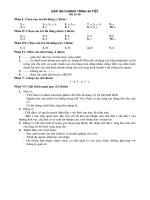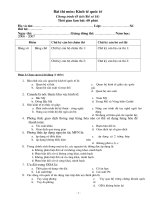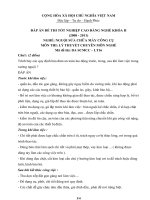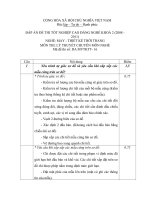PASSAGE 16
Bạn đang xem bản rút gọn của tài liệu. Xem và tải ngay bản đầy đủ của tài liệu tại đây (35.76 KB, 2 trang )
PASSAGE 16
Shoplifting is an addictive crime. There are two types of shoplifters (people who steal goods from shops):
professional criminals who do it for a living, or to earn money for a drug habit; and non-professionals.
Non-professionals know that there are consequences, and they usually have the money to pay, but they
continue to steal anyway. These people steal items they often don’t need and sometimes don’t use.
Although people of all ages shoplift, almost one third of all shoplifters arrested by the police are between
the ages of 13 and 17. Teens usually steal things that they can’t afford or are not allowed to buy, such as
CDs, cosmetics, clothes and cigarettes. But many also steal things they could simply buy. Why ?‚ “I think,
I could be spending my money on this, but I’m getting it for free,” a teenage girl said. “Besides, there’s
also the thrill of doing something bad. Your heart starts to race, and all you can think about is getting out
of the store,” the girl added.
Teens who shoplift often believe their actions don’t really hurt anyone. They don’t think that shoplifting
means stealing. They think that the store will not notice the losses. They are wrong. Stores know exactly
how many articles they lose, and the costs are huge. Ask teens who shoplift why they do it, and they
usually say they don’t know. Or they may say that it’s fun; shoplifting can cheer up the mood of a teen
who is feeling depressed, angry or bored. Friends can also force friends to shoplift together – to be cool.
But why? Shoplifters usually don’t know the true motivations behind their actions. However, shoplifting
can become an addiction. In fact, drug addicts who shoplift say it is as hard to stop stealing as it is to quit
drugs. Without intervention, shoplifting can become a dangerous lifetime habit. For teens who are just
‚trying out’ shoplifting, the best thing that can happen is getting caught. And the sooner, the better. When
they are caught by store security personnel, they feel frightened, and the experience can stop many teens
from repeating their behaviour. Shoplifting is stealing. Stealing is wrong. It’s really just that simple.
(Adapted from Weekly Reader, 2003)
Question 1. According to paragraph one, ________________.
A. non-professionals work with professionals.
B. some professionals are addicted to drugs.
C. non-professionals rarely have enough money. D. professionals steal things that they do not need.
Question 2. In paragraph two, you can find out ____________.
A. what articles were stolen by a teenage girl.
B. why people of different ages steal from shops.
C. how shoplifters manage to get out of stores.
D. what things are usually stolen by young people.
Question 3. Paragraph three is about the reasons why ______________.
A. young people steal from shops.
B. shoplifting makes people angry.
C. stores do not notice their losses.
D. teenagers say shoplifting is wrong.
Question 4. Paragraph four informs you that _______________.
A. shoplifters cannot often tell why they steal.
B. most shoplifters can’t live without taking drugs.
C. some shoplifters are scared of their bad habit. D. quitting drugs is easier than giving up stealing.
Question 5. According to paragraph five, _______________.
A. many teenagers think that shoplifting is simple.
B. it is quite easy for teenagers to get really scared.
C. some teenagers often frighten security personnel.
D. young shoplifters should be caught as soon as possible.
Question 6. Which of the following would be the best title for the text?
Page 1
A. How to Catch Shoplifters
B. How to Recognise Shoplifters
C. Teenagers Who Steal from Shops
D. Burglars Who Never Get Caught
ĐÁP ÁN
1-B
2-D
3-A
4-A
5-D
6-C
LỜI GIẢI CHI TIẾT
Question 1:
“professional criminals who do it for a living, or to earn money for a drug habit” => một số kẻ trộm siêu
thị ăn cắp vì nghiện ngập
Question 2:
+ Teens usually steal things that they can’t afford or are not allowed to buy
+ But many also steal things they could simply buy
-> Từ đoạn 2, chúng ta biết về những thứ mà bọn trẻ thường lấy trộm trong siêu thị
Question 3:
+ They think that the store will not notice the losses.
+ and they usually say they don’t know.
+ Or they may say that it’s fun
-> Đoạn 3 cho biết lý do tại sao trẻ thích ăn trộm trong siêu thị, cửa hàng
Question 4:
“Shoplifters usually don’t know the true motivations behind their actions. However, shoplifting can
become an addiction” => Đoạn 4 cho biết những người trộm cửa hàng thường không biết tại sao họ lại ăn
trộm nữa.
Question 5:
“For teens who are just ‚trying out’ shoplifting, the best thing that can happen is getting caught. And the
sooner, the better” => nên bắt ngay những đứa trẻ ăn trộm đồ càng sớm càng tốt, chúng sẽ sợ nhân viên
bảo vệ và khơng dám ăn trộm nữa.
Question 6:
Skimming ta thấy bài khóa xoay quanh tình trạng ăn trộm đồ trong siêu thị của các bạn trẻ và những lý
do, hậu quả của hành động này.
Page 2









